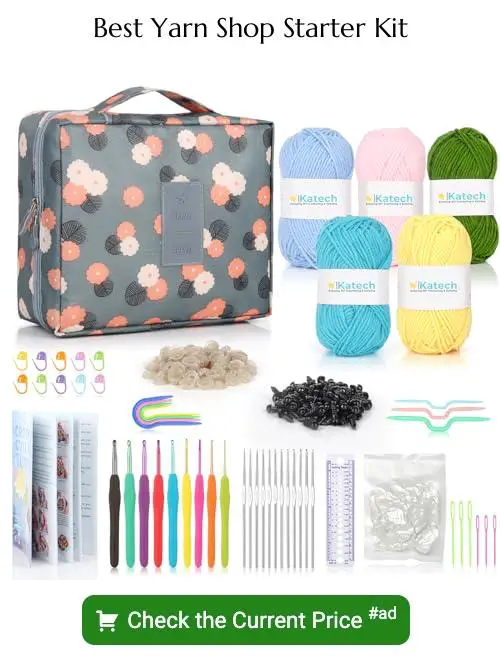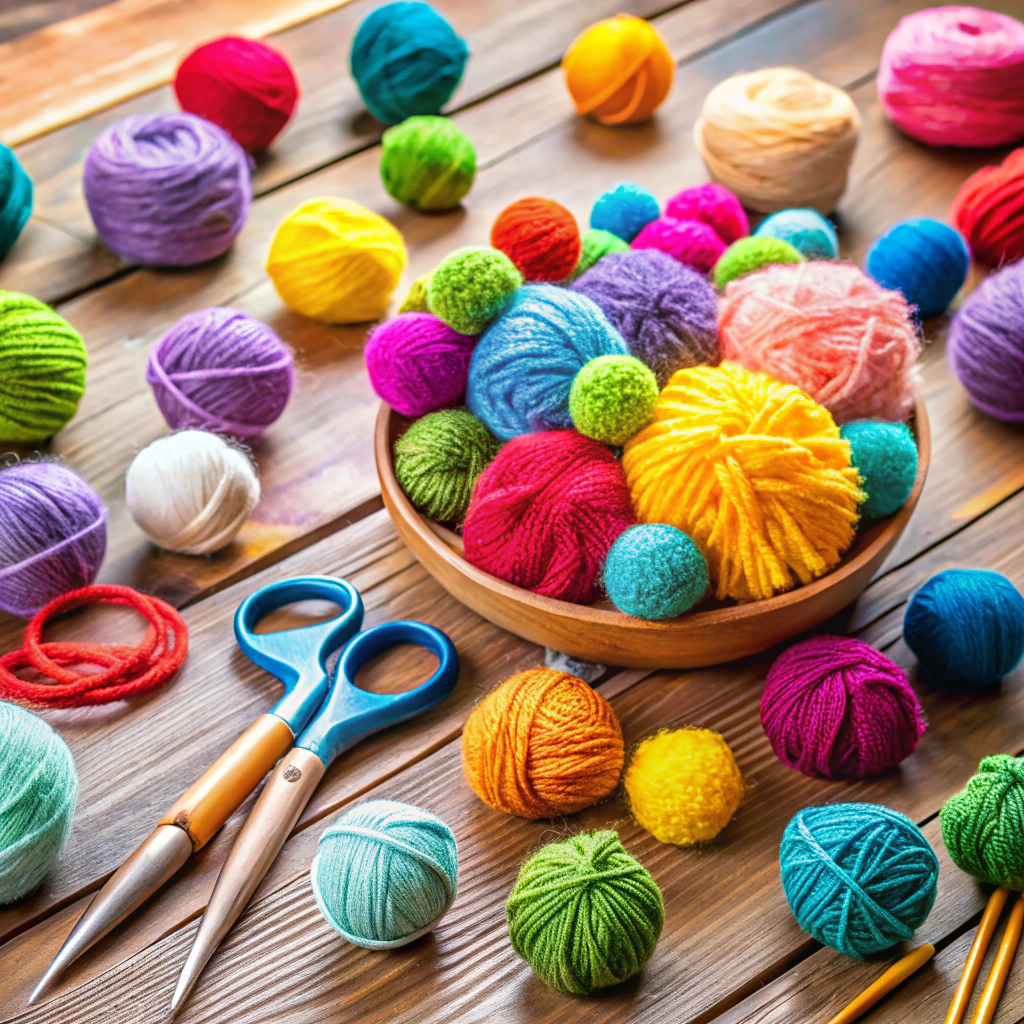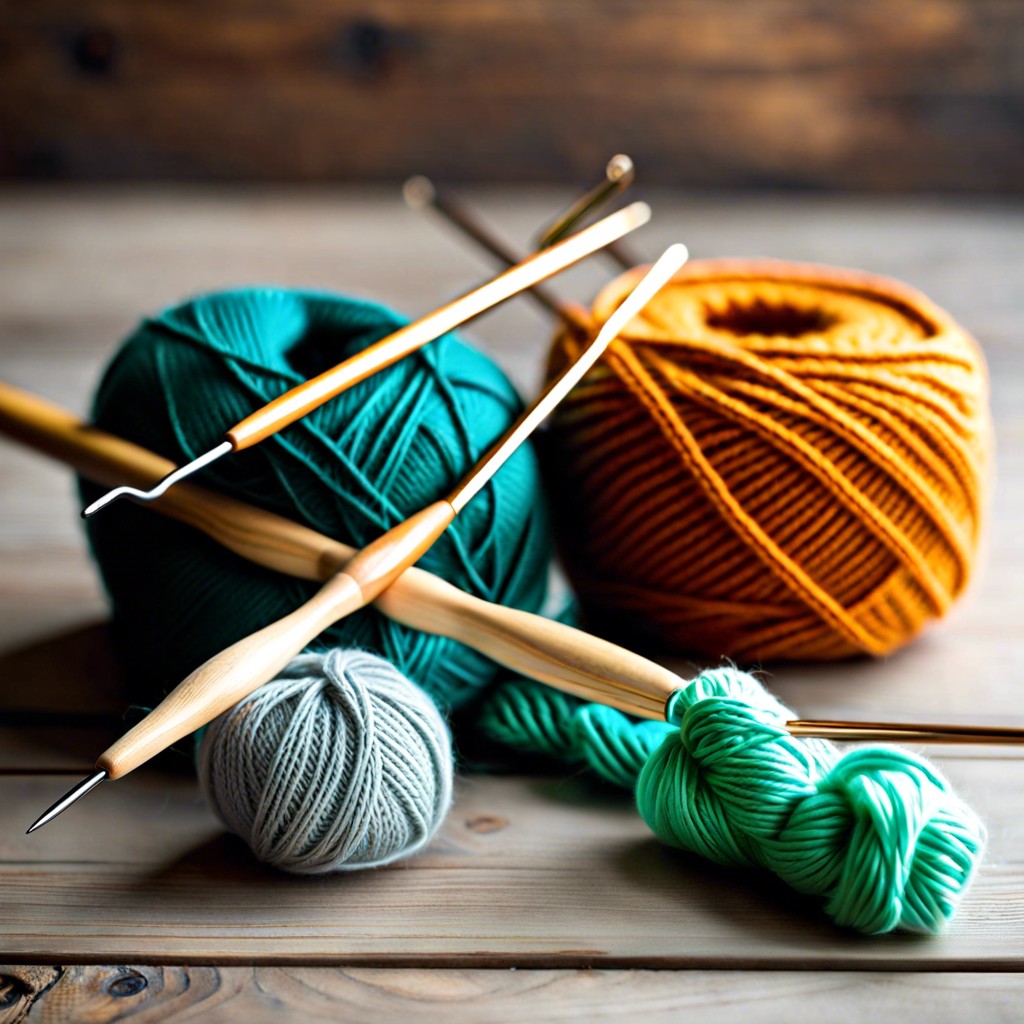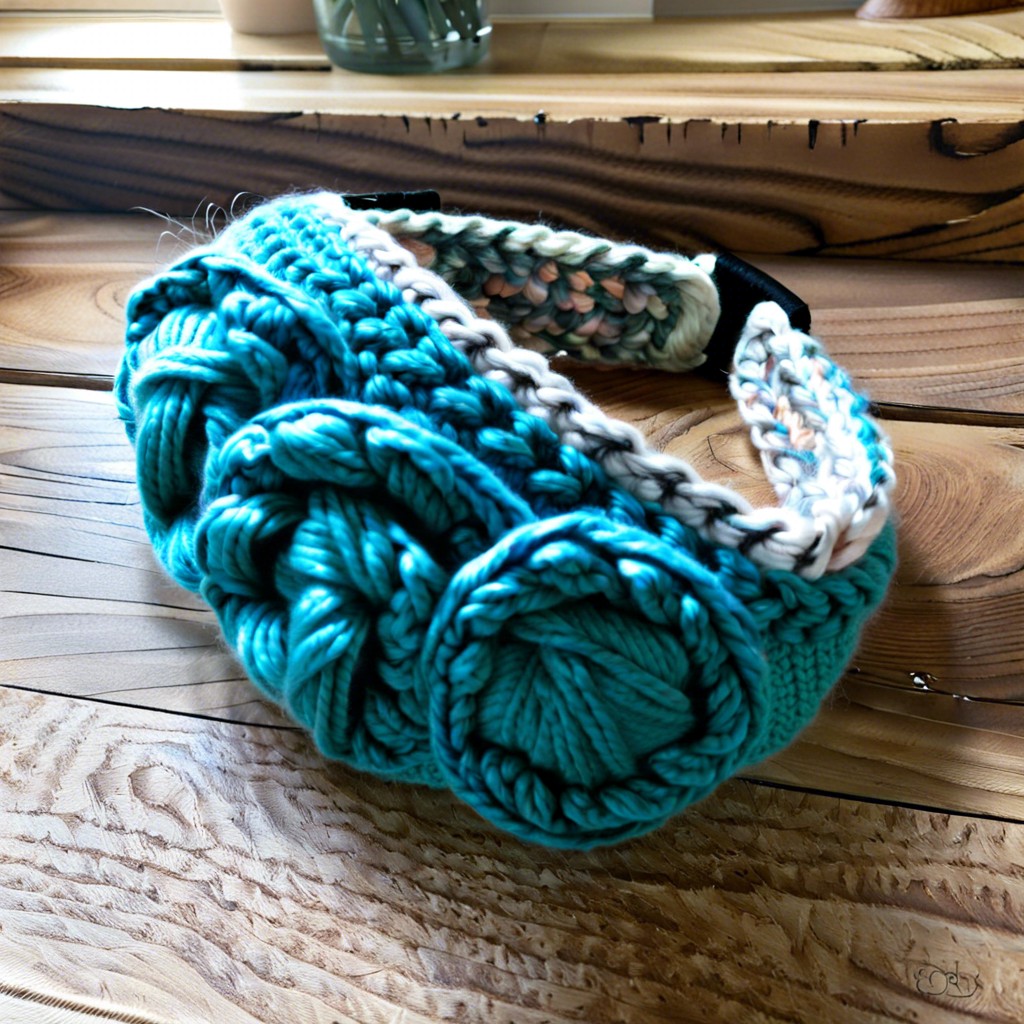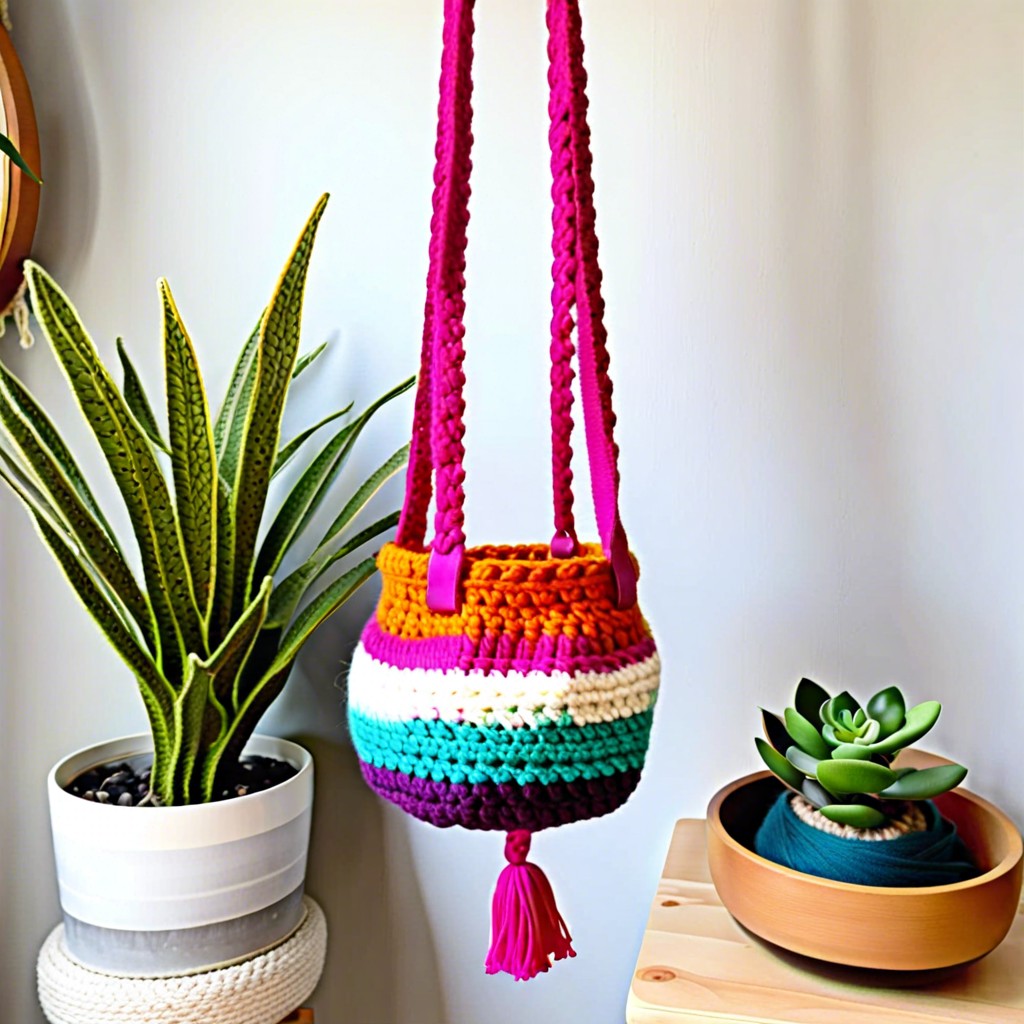Starting a yarn shop is a rewarding pursuit because it combines your passion for yarn crafts with a lucrative business opportunity.
Starting a yarn shop involves several key steps from planning, sourcing, to marketing. This article will guide you through a comprehensive process, covering everything from creating a business plan, finding the right location, sourcing high-quality yarn, setting up an inviting store layout, to implementing effective marketing strategies. Whether you’re an experienced business owner or a knitting enthusiast looking to turn your passion into a business, this article has all the details to help you open a successful yarn shop.
Key takeaways:
- Establish a clear brand and unique selling proposition
- Plan your business, consider location and store layout
- Have knowledge of yarn, customer service, and basic business concepts
- Form a legal entity and register for taxes
- Open a business bank account and credit card
Define Your Brand for the Yarn Shop

Establishing a clear identity is pivotal for your yarn shop. Think about the kind of customers you want to attract and the values you want to convey. Is it a boutique store offering luxury fibers? Or a community-oriented shop that values sustainable, local materials?
Identify your unique selling proposition. This could be your unparalleled selection of rare yarns, your exceptional customer service, or workshops and classes you offer for beginners and experienced crafters. Crafting your brand around what makes your store special can help you stand out in the market.
Your brand also extends to your store’s visual identity. Choose colors, signage, and interior décor that reflect your shop’s ethos. Also, consider your shop’s name. It should be memorable, easy to pronounce and spell, and indicative of what you sell.
This cohesive approach to branding will make your yarn shop memorable and distinguishable and position your offerings clearly in the mind of your target customers.
Plan Your Yarn Store Business
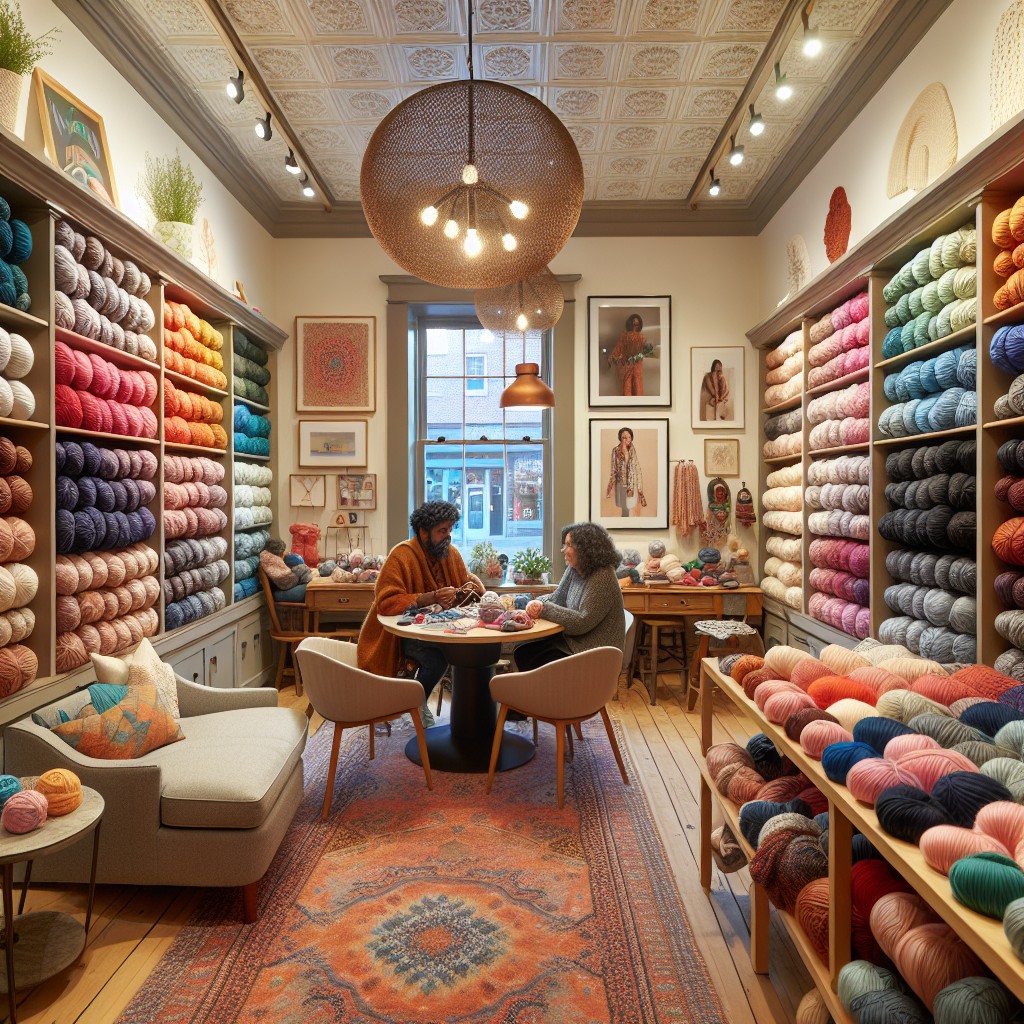
When it comes to laying out plans for your yarn store, comprehending your target audience comes in first. Are they seasoned knitters looking for specialty yarns, or craft hobbyists seeking more general knitting supplies? The answer shapes your product range significantly.
Next, consider the shop’s location. An easily accessible site with high foot traffic might be ideal. Look into the competitive landscape too. Are there any rival yarn stores nearby which your shop has to compete with?
Then, think about the setup and display. An attractive, well-organized display can be a magnetic factor for customers. Ensure there is clear signage for different types of yarns, organized by color, material, and weight.
Lastly, having a diverse inventory is necessary but beware of overstocking. Carefully monitor the demand and adjust stock levels accordingly to avoid inventory overloads. Consistent and strategic planning will ensure your yarn store functions smoothly while making sure that the business thrives. Remember, customer satisfaction should remain at the heart of every business decision you make.
Discover Skills and Experiences Needed for a Successful Yarn Store

Having a thorough understanding of different types of yarns and their specific uses is vital. Knowledge about various knitting and crocheting techniques aids in assisting customers with their projects. A keen eye for colour and texture ensures a well-curated shop.
Strong customer service skills are important for building relationships with the crafting community. Your ability to listen to a knitter’s needs or a crocheter’s project plan and offer appropriate yarn and advice will earn their trust and repeat business.
Experience with basic business concepts like inventory management, merchandising, and bookkeeping is beneficial. Lastly, passion for yarn crafts is at the heart of owning a yarn shop. It fuels the persistence required to run a successful business while keeping it enjoyable and personally rewarding.
Form a Legal Entity for Your Yarn Store

Establishing a legal entity is vital for personal asset protection. It separates your business transactions from personal involvement, safeguarding your personal assets from business liabilities and debts. Legal entity options often include Limited Liability Company (LLC), Corporation, or Partnership.
To initiate the process, you need to select a unique business name and register it with the state’s Secretary of State office, typically for a small fee. Once done, get an Employer Identification Number (EIN) from the Internal Revenue Service (IRS). It’s free and can be acquired online or via mail.
For enhanced credibility, consider seeking legal advice to understand the nuances of each entity type. This professional guidance can prove paramount while traversing complex aspects like legal compliance, operational structure, and tax regulations.
Remember, pacing the process correctly and adhering to state guidelines can lay a concrete foundation for your yarn shop, setting you up for success.
Register Your Yarn Store for Taxes
Ironically, taxation can be a tangled mess more complex than the trickiest crochet pattern. To navigate it smoothly, follow these simple steps:
1. Procure an Employer Identification Number (EIN) from the IRS. This is essentially your business’s social security number. Most businesses are required to have an EIN. To apply, go to the IRS’s website.
2. Determine the specific tax laws in your municipal and state jurisdictions. They vary widely, making it important to do your research or have a tax professional assist. Some areas may require additional forms or specific types of tax.
3. Document all business transactions meticulously. Remember, every spool of yarn, knitting needle, or crocheting hook you purchase for the shop is a tax write-off.
4. Keep up-to-date with deadlines. Late filings can result in hefty penalty fees.
5. Consider hiring a tax professional. They can save time, reduce stress, and often save you money by spotting deductions you might have missed. A portion of their cost can also be a business expense and tax-deductible.
Take a deep breath and knit your way through each step at a time knowing that although it might seem daunting, many have navigated the tax terrain successfully and so can you.
Open a Business Bank Account & Credit Card for Your Yarn Store
Once your yarn store’s legal framework is in place, it’s crucial to separate your personal finances from the business. Not only does this make financial management easier, but it also adds another layer of legal protection and enhances your business’s credibility.
Here are some points to consider:
- 1. Choose a bank account that suits your business needs. Consider factors like transaction volume, banking fees, and access to online banking services.
- 2. Business credit cards are excellent for managing expenses. They come with advantages like reward programs, cash backs, and travel points that can help offset business costs. Always compare card providers to find the best offer.
- 3. This separation further simplifies tax preparation as it helps to segregate taxable earnings, deductible expenses and investment capital, effectively streamlining the accounting process.
- 4. Having a dedicated business bank account and credit card can also make your yarn store appear more professional to suppliers and customers.
Set Up Business Accounting for the Yarn Shop
Establishing an in-depth record-keeping system is crucial for understanding the financial performance of your store. You might consider consulting with a business accountant or a finance professional. They can help you choose smart strategies to track expenses, payroll, and other financial aspects.
When done properly, this ensures smooth tax procedures and helps define future projections based on past financial performance. Software like QuickBooks or Xero can simplify this task, offering user-friendly interfaces designed specifically for small businesses.
Remember, having frequent check-ins on your business’s financial health is essential to maintain your store’s cash flow and achieve long-term profitability.
Ensure Business Insurance for the Yarn Store
Securing business insurance should not be overlooked. It provides protection against potential financial risk due to unforeseen circumstances. For starters, consider property insurance to cover any damages to the business location, and inventory insurance for your precious yarn stock in case of theft or damage.
Additionally, depending on your location, worker’s compensation coverage may be mandatory if you have hired staff. Another indispensable plan would be public liability insurance, safeguarding you in case of claims of property damage or personal injury caused by your business operations. Lastly, consider business interruption insurance to cover lost profits in instances where you can’t operate due to an insured event.
All in all, consulting with an insurance professional to get tailored advice for your specific business scenario is highly recommended. Remember, effective planning is key to ensuring the well-being of your venture!
Obtain Necessary Permits and Licenses for the Yarn Store
Securing the correct permits and licenses is vital in running a successful yarn shop. Neglecting this step could earn heavy fines, or worse, cause your shop’s closure. Be sure to:
- Research Local Regulations: Different jurisdictions have unique sets of rules and permits. Consult your local government office regarding requirements for a new retail business.
- Obtain A General Business License: This license is a standard requirement in the majority of cities and states.
- Have a Resale Permit in Hand: If planning to purchase yarn wholesale and resell it, most states will require a seller’s permit or resale license.
- Be Aware of Zoning Laws: Ensure the location of your yarn shop fits within the perimeters of your local zoning laws.
- Conduct Regular Health and Safety Checks: Retail establishments often must comply with certain health and safety regulations.
Remember, each area may have varying requirements, so what applies in one place may not be necessary in another. Always verify with your local authorities to ensure you’re operating within the law.
Establish Relationships for Special Yarn Orders
Building relationships with yarn suppliers and manufacturers is crucial in the successful running of your yarn shop. These partnerships not only lead to direct benefits such as discounts and exclusive access to new products, but they also allow you to fulfill customers’ special or custom orders effectively.
Firstly, research and identify potential suppliers. Look out for those who can provide a range of products, from standard to high-end yarns in different materials and colors. This will ensure you meet varying customer preferences.
Secondly, foster a mutually beneficial relationship. Regular and prompt payments, bulk orders, and promoting their product in-store are ways to do this.
Finally, maintain seamless communication. Keep the lines of conversation open for discussing new products, market trends, and customer feedback.
Remember, these relationships can be instrumental in getting those special yarn orders quickly and efficiently, thereby enhancing customer satisfaction and contributing to your shop’s reputation.
Examine the Growth Potential for a Yarn Store
Assessing the growth potential of a yarn shop requires keen insight into your customer base as well as the knitting and crocheting industry. With the rise of DIY projects and handmade gifts, the demand for knitting and yarn stores has grown.
Leveraging market research tools to understand your target demographics is essential. Regularly survey your customers to know their preferences on yarn types, colors, needle sizes, and pattern styles. This data will help you meet the evolving demands of your customers and increase market share.
Furthermore, examine upcoming trends in the knitting and crocheting world. Whether it’s a new type of yarn or a novel knitting technique, staying ahead in the industry will help your shop grow. Attendance at trade shows, subscribing to industry publications, and joining knitting or crafting associations can provide valuable insight.
Last but not least, creating a robust online presence can drive your growth potential even further. An engaging website and active social media channels can not only pull in digital traffic but also convert it into physical customers visiting your store.
Remember, the growth potential for your yarn store mainly depends on your ability to adapt to your customer needs and the changing trends in the industry.
Understand What Happens During a Typical Day At a Yarn Store
A yarn shop’s typical business day is diverse and dynamic, each turning page driven by a variety of operations. In this local haven of creativity, the primary task involves selling yarn and related products like needles, patterns, and accessories. Equally critical, staff ensure the merchandise is creatively displayed and restocked, maintaining an inviting and inspiring environment for crafting enthusiasts.
Customer service is central, responding to queries about yarn types, providing advice on alternating yarn in patterns or recommending suitable yarns for particular projects. Besides, workshops and classes may be hosted, teaching knitting, crocheting, and other fiber techniques, and building a community hub for local yarn enthusiasts. Behind the scenes, there is administrating stock, processing payments, maintaining the online presence, and constantly learning about new yarn types and crafting trends to serve the customers better.
Learn Insider Tips for Jump Starting a Yarn Store
Building your customer base can often take some time, whether online or brick-and-mortar, but certain insider tips can significantly improve this rate. First, consider hosting special events. Things like knitting classes or crochet workshops are a great way to draw in a crowd.
Secondly, don’t overlook the power of social media and online marketing. Use these platforms to display your products, engage with potential customers, and share helpful content, such as knitting or crocheting tips and patterns.
Thirdly, ensure to provide excellent customer service. This comprises responding promptly to queries, offering help with yarn choices and patterns, and creating an overall pleasant shopping experience that would have customers returning and becoming regulars.
Lastly, partnerships can be beneficial. Collaborate with local knitting, crocheting clubs or even nearby cafes to hold yarn-related events. These events can expand your reach and expose your store to a wider audience that already has an interest in yarn crafts.
Create a Professional Website for Your Yarn Shop
In today’s digital age, a secure online presence is vital. Your website acts as the virtual storefront, enabling customers to discover your offerings from anywhere, anytime. It should be visually appealing, user-friendly, and updated regularly with new products, promotions, and potential workshops or classes.
1. High-Quality Images: Showcase your products with high-resolution images to engage and attract potential customers. Highlight the tactile nature of yarn and other products.
2. Comprehensive Product Descriptions: Detail the properties, uses, and relevant information like fiber content, weight, and care instructions for each product to make it easy for shoppers to ascertain if it fits their project needs.
3. Secure Payment Gateway: A reliable and universally accepted payment gateway gives a boost to your brand’s reputation and encourages repeat purchases.
4. Seamless Navigation: The user interface should be simple and intuitive, allowing customers to browse with minimal clicks. Functionality, such as sorting and filtering options, enhances the shopping experience.
5. E-Newsletter Sign-up: Capture customer’s emails for regular newsletters to launch new products, upcoming classes, workshops, or promotions. A well-curated newsletter fosters customer engagement and repeat business.
Remember, your website is more than just a sales platform—it’s an opportunity to build a community around your craft. Promote engaging content, such as tutorials, patterns, or blog posts related to knitted or crocheted projects, to drive traffic and engagement to your site.
FAQ
How much does it cost to start a yarn shop?
Starting a yarn shop typically requires an initial investment of approximately $20,000 which covers costs such as products, rent, utilities, account services, insurance, shop equipment, social media and website services, as well as initial staff expenses.
What is the target market for a yarn shop?
The primary target market for a yarn shop includes craft enthusiasts, specifically those who engage in activities like knitting and crocheting.
How to sell your own yarn?
To sell your own yarn, consider using online marketplaces like eBay where you can opt for a ‘Buy It Now’ price or list your items as an auction, particularly suitable for selling in bulk lots or unlabeled yarn.
What are the essential supplies needed in a yarn shop?
A yarn shop essentially needs a wide variety of yarns in different colors and textures, knitting and crochet needles of various sizes, pattern books, stitch markers, darning needles, yarn bowls, needle gauge, row counters, project bags, and knitting or crochet kits for beginners.
How can you differentiate your yarn shop from competitors?
To differentiate your yarn shop from competitors, offer unique, quality yarns, provide exceptional customer service, arrange hands-on workshops, engage customers with a cozy atmosphere, and establish a strong online presence via relevant content and ecommerce capabilities.
How can one leverage online platforms to grow their yarn shop business?
One can leverage online platforms to grow their yarn shop business by utilizing social media for marketing, creating engaging content like tutorials and patterns, offering online sales, and participating in craft-centred digital forums.
